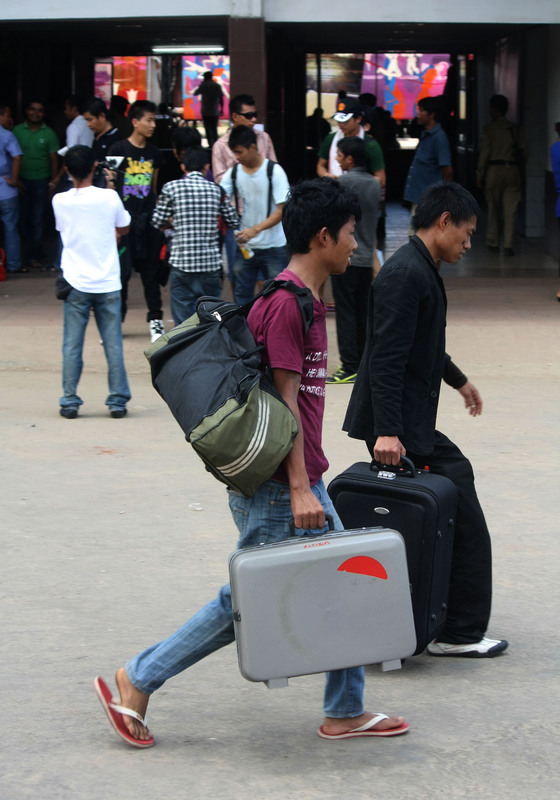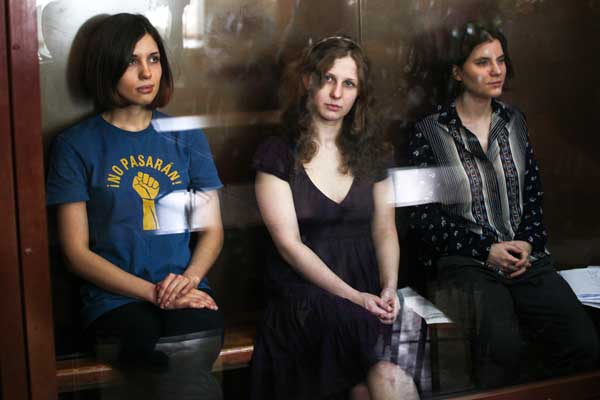Index relies entirely on the support of donors and readers to do its work.
Help us keep amplifying censored voices today.
 Sukumar Muralidharan says Delhi’s censorship may only worsen sectarian violence (more…)
Sukumar Muralidharan says Delhi’s censorship may only worsen sectarian violence (more…)
When looking at freedom of expression globally, it is important to look at how access to it is limited — and who is being shut out. A global deficiency in gender equality goes hand in hand with a lack of free expression, as spelled out through trends in political representation, education, and political participation. A lack of freedom of expression is particularly illustrated in the disparity in literacy rates for women vs. men, as well as representation in national bodies.
Of the world’s estimated 796 million illiterate adults, 64 per cent are women — restricting access to information, education, and public debates taking place online or in newspapers. Women experience a much higher rate of illiteracy — as seen in India, where one in two women are illiterate versus a rate of one in four men.
Women only make up 20% of all national parliaments worldwide, meaning that they only account for 9,206 of 46,048 elected seats. Without representation in national bodies, women are being kept out of wider discussions on social, economic, and political issues. Even in developed nations, representation for women is a major problem. Women in the UK, for example, only hold 145 of the 650 seats in Parliament. With fewer women in decision-making roles across the board, there must be a discussion on how to promote and ensure free expression for all women.
While many well-established international initiatives exist to tackle gender inequality, many do not explicitly protect freedom of expression. The Convention on the Elimination of All Forms of Discrimination Against Women (CEDAW), for example, places importance on political participation, human rights and education for women. CEDAW, first ratified in 1979, has been ratified by 187 out of 193 countries worldwide, but it does not include direct support for free expression for women as a key right.
It is vital that countries actually implement key international measures to promote gender equality — including CEDAW — rather than merely paying lip service to such commitments. In addition, it would be a huge step forward if international bodies and declarations commit states directly to ensuring equal and full access to free expression for all women.
Sara Yasin is editorial assistant at Index on Censorship
A recent World Bank report, Maximizing Mobile, offers some startling facts on the spread of mobile technology.
“…in some developing countries, more people have access to a mobile phone than to a bank
account, electricity, or even clean water. Mobile communications now offer major opportunities to advance human development—from providing basic access to education or health information to making cash payments to stimulating citizen involvement in democratic processes.”
There are now over six billion mobile phone subscriptions in the world: even allowing for the many multiple subscribers, it’s feasible that everyone in the world who wants a mobile device will have one in the near future.
It is more appropriate to say “mobile device”, because the days when these things were used mainly for the making and receiving of phone calls is long gone. “Phones” are now used for a variety of purposes. This is particularly true in the developing world, where, in large swathes, desktop technology has been bypassed, and feature phone and smartphones now fulfil a huge amount of functions.
Smartphone sales were up 43 per cent in the second quarter of this year, despite a 2 per cent decrease in the overall sales of mobile devices.
While this boom is happening all over the world, a debate is raging in the UK which could have a significant effect on access to information in the developing world. Mobile phone companies here routinely filter web content considered “sensitive” for under-18s. Earlier this year, the Open Rights Group report Mobile Internet Censorship: What’s Happening and What We Can Do About It noted:
“We think there are a number of serious problems with how these systems work. These include a lack of transparency, mistakes in classifying sites the difficulty of opting out of the filtering. Together, these problems mean that people often find content blocked when it shouldn’t be.”
Well quite. On my own previous phone contract, I was unable to view this very site, which, while occasionally discussing controversial topics, is not exactly a hotbed of vice.
Sensitive information we now can get blocked also includes health advice, a massive issue in the developing world. If we accept the blunt instrument that is smartphone filtering, then there is no reason why phone companies would not make the technology universal. Which may be acceptable in the developed world, with our myriad ways of accessing information. But in parts of the world dependent on the mobile device, we could be denying information to people who need it most.
 Three members of feminist punk band Pussy Riot were today found guilty of “hooliganism motivated by religious hatred” by a Moscow court, and sentenced to two years in prison.
Three members of feminist punk band Pussy Riot were today found guilty of “hooliganism motivated by religious hatred” by a Moscow court, and sentenced to two years in prison.
Kirsty Hughes, Chief Executive of Index on Censorship, said:
“In Putin’s Russia, free expression has become a crime. The women of Pussy Riot should be released immediately — and should never have been put through this absurd case. Artistic expression is not a crime — it’s a right, and an integral part of all free societies. The PussyRiot verdict is the latest indication that Vladimir Putin’s Russia does not respect human rights and is sliding backwards to dictatorship”.
Nadezhda Tolokonnikova, Maria Alekhina and Ekaterina Samutsevic were arrested in March, after performing a 40-second “punk prayer” against Russian President Vladimir Putin in Moscow’s Christ the Saviour Church. The case has been condemned by activists as being politically motivated, and has drawn criticism from well-known musicians from across the globe.
For media enquiries on this story, please contact [email protected]